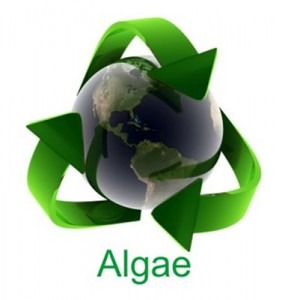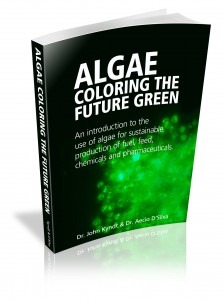By: Dr. John Kyndt – Head Scientist of the Renewable Energy Program at Advanced Energy Creations Lab .
 Large multinational bottling companies are currently spending millions of dollars to promote a greener image to their plastic bottles. Think for example of the new Coke “Plant Bottle” which contains up to 30% of corn-based materials.
Large multinational bottling companies are currently spending millions of dollars to promote a greener image to their plastic bottles. Think for example of the new Coke “Plant Bottle” which contains up to 30% of corn-based materials.
Although these are positive steps into the direction of increased sustainability, it is tempting to wonder if these are not merely marketing campaigns. Whether sincere or not, these solutions are still far from truly bio-based and biodegradable bioplastics.
A true bioplastic would be 100% based on renewable bioresources and fully biodegradable within a reasonable time. Ideally it would replace the need for fossil based oil and there would be net zero CO2 emission during the production process.
However, to provide an economically viable solution it is important that the new product is compatible with existing manufacturing equipment and processing and that it can be priced competitively to petroleum based plastics. Given the necessary research and investment we believe that algae have the potential to be the disruptive feedstock that can change our plastics and fuels of the future.
Current research is targeting chemicals which have properties that make them potential substitutes for current petrochemicals. The production cost is an important factor, in order for the new biomass-based chemicals to compete with current petrochemicals and thereby find an initial niche in the market. In addition it is important to perform a full life cycle analysis (LCA) of any new alternative solution.
Lactic acid and its polymer poly-lactic acid (PLA) can be used as building blocks for alternatives to fossil derived polymers like PET plastics and polystyrene. Currently PLA is already used as a biodegradable alternative for packaging and as fiber materials and could very well become economically viable alternatives on a large scale in the future (current PLA production is 450K tons per year).
Lactic acid can be produced by bacterial fermentation of plant or algal biomass. Besides in packaging, PLA polymers have been used for decades in the medical industry in e.g. resorbable implants. The big advantage is that PLA can be produced from renewable non-food based sources like algae and is completely degradable.
Propanediol can be produced from glycerol and is expected to find increasing applications in the near future. Interestingly glycerol is the major byproduct from biodiesel production. As the price of glycerol decreases in the near future due to increasing biodiesel production, propanediol will become more competitive.
The production of propanediol from glycerol is in itself a relatively cheap dehydration process. 1,2-propanediol is currently produced in quantities of larger than 500K per year from petrochemicals, but its production level is expected to increase if a cheaper production source can be found (e.g. like cheap glycerol).
Besides the innovative production of these building blocks from renewable sources, a large portion of the R&D efforts are focused on additives to strengthen and optimize these bioplastics so they are suitable for molding and extrusion and have a high impact strength.
Initially the main R&D focus for most plastic producing companies is expected to be on hybrid plastics that replace only a certain percentage of the fossil oil derived compounds, however there is a global push to develop a fully bio-based and biodegradable alternative to PET. A recent trend is that certain places and even whole cities are banning bottled drinks to decrease their chronic waste problem.
The development of algae-based plastics could become a breakthrough technology that provides an acceptable alternative to petroleum based plastics. While absorbing CO2 from the industrial process, algae generate biomass that could be turned into sustainable, renewable plastic products and biofuels and reduce our unsustainable need for fossil fuels.



I’ve recently started a blog, the information you provide on this site has helped me tremendously. Thank you for all of your time & work.
someone who knows their stuff and can write well equals a fantastic read, thanks
Great article, i
We need more from you!
Hello,I obtain that your site is really instructive and helpful and we wonder if there is really a possibility of obtaining More articles like this on your blog.
I was acutely pleased to turn up this site.I wanted to thank you on this great impute to!! I obviously enjoying every little trace of it
Took me time to read all the comments, but I really enjoyed the article. It proved to be Very helpful to me and I am sure to all the commenters here!
Hello everyone thanks for good information. Top information. The biofuels industry needs to aware of this top quality blog.
I’ve already bookmark this article and will definitely refer this article to all my close friends and colleagues. Thanks for posting!
Just want to say thanks for the information you gave to us!
Excellent article. Congratulations.
Gonna link to this, I think my readers would like this as well. good work
Thanks for the info
wonderful share, great article, very usefull for me…thanks
Wonderful information to my project
nice share, good
article, very usefull for me…thank you
Just want to say what a great blog you got here!
Thumbs up, and keep it going!
Excellent Biofuels free information. You’re doing a great job and helping many like me. Thanks
Great article, thank you very much!
good stuff hopefully i learned from it.
hey there I just wanted to comment your blog and say that I really enjoyed reading your blog post here. It was very informative and I also digg the way you write! Keep it up and I’ll be back to read more soon mate